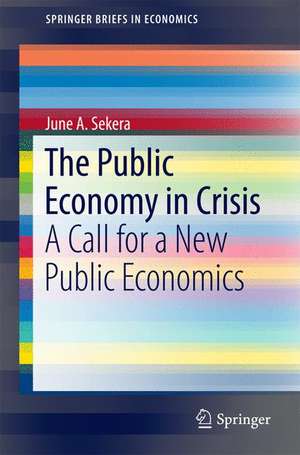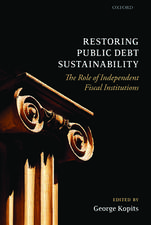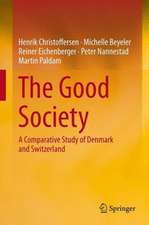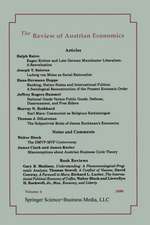The Public Economy in Crisis: A Call for a New Public Economics: SpringerBriefs in Economics
Autor June A. Sekeraen Limba Engleză Paperback – 11 iul 2016
Din seria SpringerBriefs in Economics
-
 Preț: 444.35 lei
Preț: 444.35 lei -
 Preț: 264.79 lei
Preț: 264.79 lei - 15%
 Preț: 462.51 lei
Preț: 462.51 lei -
 Preț: 47.33 lei
Preț: 47.33 lei -
 Preț: 353.14 lei
Preț: 353.14 lei -
 Preț: 273.32 lei
Preț: 273.32 lei -
 Preț: 376.04 lei
Preț: 376.04 lei -
 Preț: 379.09 lei
Preț: 379.09 lei -
 Preț: 380.07 lei
Preț: 380.07 lei -
 Preț: 377.35 lei
Preț: 377.35 lei -
 Preț: 379.09 lei
Preț: 379.09 lei -
 Preț: 376.59 lei
Preț: 376.59 lei -
 Preț: 408.27 lei
Preț: 408.27 lei -
 Preț: 379.09 lei
Preț: 379.09 lei -
 Preț: 383.27 lei
Preț: 383.27 lei -
 Preț: 378.54 lei
Preț: 378.54 lei -
 Preț: 377.95 lei
Preț: 377.95 lei -
 Preț: 340.23 lei
Preț: 340.23 lei -
 Preț: 380.25 lei
Preț: 380.25 lei -
 Preț: 378.12 lei
Preț: 378.12 lei -
 Preț: 376.04 lei
Preț: 376.04 lei -
 Preț: 376.04 lei
Preț: 376.04 lei -
 Preț: 379.68 lei
Preț: 379.68 lei -
 Preț: 381.00 lei
Preț: 381.00 lei -
 Preț: 375.23 lei
Preț: 375.23 lei -
 Preț: 376.80 lei
Preț: 376.80 lei -
 Preț: 378.54 lei
Preț: 378.54 lei -
 Preț: 377.57 lei
Preț: 377.57 lei -
 Preț: 376.04 lei
Preț: 376.04 lei -
 Preț: 378.92 lei
Preț: 378.92 lei -
 Preț: 375.62 lei
Preț: 375.62 lei -
 Preț: 379.09 lei
Preț: 379.09 lei -
 Preț: 353.67 lei
Preț: 353.67 lei -
 Preț: 342.14 lei
Preț: 342.14 lei -
 Preț: 375.45 lei
Preț: 375.45 lei -
 Preț: 379.09 lei
Preț: 379.09 lei -
 Preț: 377.35 lei
Preț: 377.35 lei -
 Preț: 344.86 lei
Preț: 344.86 lei -
 Preț: 377.35 lei
Preț: 377.35 lei -
 Preț: 345.89 lei
Preț: 345.89 lei -
 Preț: 377.57 lei
Preț: 377.57 lei -
 Preț: 343.83 lei
Preț: 343.83 lei -
 Preț: 378.12 lei
Preț: 378.12 lei -
 Preț: 345.06 lei
Preț: 345.06 lei -
 Preț: 379.48 lei
Preț: 379.48 lei -
 Preț: 379.48 lei
Preț: 379.48 lei -
 Preț: 380.07 lei
Preț: 380.07 lei -
 Preț: 375.45 lei
Preț: 375.45 lei -
 Preț: 445.33 lei
Preț: 445.33 lei -
 Preț: 378.54 lei
Preț: 378.54 lei
Preț: 445.88 lei
Nou
Puncte Express: 669
Preț estimativ în valută:
85.32€ • 89.32$ • 70.60£
85.32€ • 89.32$ • 70.60£
Carte tipărită la comandă
Livrare economică 07-21 aprilie
Preluare comenzi: 021 569.72.76
Specificații
ISBN-13: 9783319404868
ISBN-10: 3319404865
Pagini: 95
Ilustrații: XV, 128 p. 7 illus., 4 illus. in color.
Dimensiuni: 155 x 235 x 8 mm
Greutate: 0.21 kg
Ediția:1st ed. 2016
Editura: Springer International Publishing
Colecția Springer
Seria SpringerBriefs in Economics
Locul publicării:Cham, Switzerland
ISBN-10: 3319404865
Pagini: 95
Ilustrații: XV, 128 p. 7 illus., 4 illus. in color.
Dimensiuni: 155 x 235 x 8 mm
Greutate: 0.21 kg
Ediția:1st ed. 2016
Editura: Springer International Publishing
Colecția Springer
Seria SpringerBriefs in Economics
Locul publicării:Cham, Switzerland
Cuprins
1. “Government is broken”: the collapse of the public governing capacity.- 2. Case examples: how market-centric economics has despoiled government.- 3. A failed private to public transplant: the New Public Management.- 4. Why the transplant doesn’t work.- 5. An absence of theory.- 6. The public nonmarket: elements of a new theory.- 7. Developing an intellectual infrastructure.- Appendices.- 1. Case examples in detail.- 2. Would-be replacements for New Public Management.
Recenzii
“The Public Economy in Crisis fills a growing void in economics and public policy: the need for an economic theory of the state. The Trumpian turn aims at a complete retrenchment of the state in promoting social welfare. A moment will arrive when this view is widely considered impoverished, cynical, scientifically simplistic and ethically blind, uncaring, racist and classist.” (W. Milberg, real-world economics review, Vol. 86, 2018)
Notă biografică
June Sekera, a Research Fellow at the Global Development and Environment Institute (GDAE) at Tufts University, is a public policy practitioner and researcher. Her economics training was at MIT and at Harvard’s Kennedy School of Government, from which she earned a Masters in Public Administration. Recent research has been focused on the systemic dynamics and drivers of the public economy, and on problems of outcomes measurement in non-market environments. Other published articles and papers have dealt with public goods and public non-market production. She is founder and co-leader of GDAE’s Public Economy Project, whose current initiatives involve studies of “The Public Economy – Its Nature, Scope and Measurement” and of the “Essential Economy.” The latter looks at how the public economy and the core economy represent fundamental economic systems without which the market could not operate. June has held leadership and management positions in the United States at federal, state and local levels of government. Her areas of content specialization include workforce training and development, labor exchange, public education, adult education, and economic development. She has been an advisor to national, state and local government and non-profit organizations on policy and program development, performance measurement and program evaluation.
Caracteristici
Proposes a new theory of public economics relevant to the realities of modern, democratic nation states Illustrates how the public economy differs from the market model and why those differences matter Integrates work and thought across the disciplines of economics, political science and public administration Includes supplementary material: sn.pub/extras

















